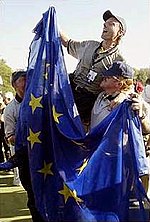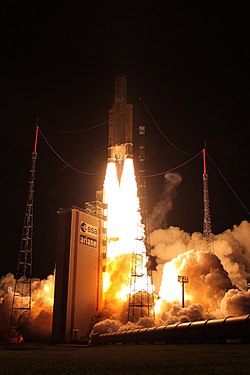
The European Union (EU) is a supranational political and economic union of 27 member states that are located primarily in Europe. The Union has a total area of 4,233,255 km2 (1,634,469 sq mi) and an estimated total population of over 448 million. The EU has often been described as a sui generis political entity combining the characteristics of both a federation and a confederation.
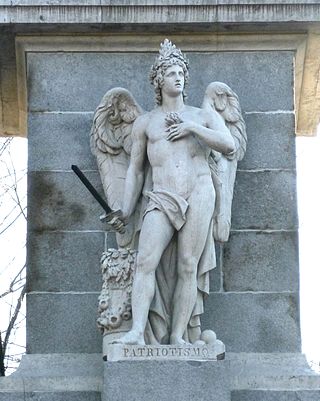
Patriotism is the feeling of love, devotion, and a sense of attachment to a country or state. This attachment can be a combination of different feelings for things such as the language of one's homeland, and its ethnic, cultural, political, or historical aspects. It may encompass a set of concepts closely related to nationalism, mostly civic nationalism and sometimes cultural nationalism.

The European Union is a geo-political entity covering a large portion of the European continent. It is founded upon numerous treaties and has undergone expansions and secessions that have taken it from six member states to 27, a majority of the states in Europe.
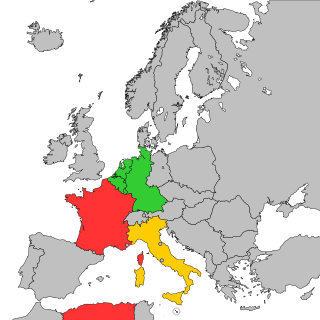
The Treaty establishing the European Defence Community, also known as the Treaty of Paris, is an unratified treaty signed on 27 May 1952 by the six 'inner' countries of European integration: the Benelux countries, France, Italy, and West Germany. The treaty would have created a European Defence Community (EDC), with a unified defence force acting as an autonomous European pillar within the North Atlantic Treaty Organization (NATO). The ratification process was completed in the Benelux countries and West Germany, but stranded after the treaty was rejected in the French National Assembly. Instead, the London and Paris Conferences provided for West Germany's accession to NATO and the Western European Union (WEU), the latter of which was a transformed version of the pre-existing Western Union. The historian Odd Arne Westad calls the plan "far too complex to work in practice".
Eurobarometer is a series of public opinion surveys conducted regularly on behalf of the European Commission and other EU institutions since 1973. These surveys address a wide variety of topical issues relating to the European Union throughout its member states.
European integration is the process of industrial, economic, political, legal, social, and cultural integration of states wholly or partially in Europe, or nearby. European integration has primarily but not exclusively come about through the European Union and its policies.

Figures for the population of Europe vary according to the particular definition of Europe's boundaries. In 2018, Europe had a total population of over 751 million people. 448 million of that live in the European Union and 110 million live in European Russia, Russia being the most populous country in Europe.

German nationalism is an ideological notion that promotes the unity of Germans and of the Germanosphere into one unified nation-state. German nationalism also emphasizes and takes pride in the patriotism and national identity of Germans as one nation and one people. The earliest origins of German nationalism began with the birth of romantic nationalism during the Napoleonic Wars when Pan-Germanism started to rise. Advocacy of a German nation-state began to become an important political force in response to the invasion of German territories by France under Napoleon Bonaparte.
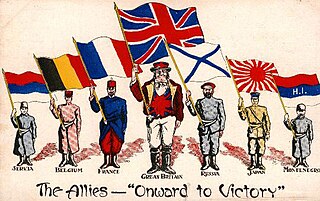
National identity is a person's identity or sense of belonging to one or more states or one or more nations. It is the sense of "a nation as a cohesive whole, as represented by distinctive traditions, culture, and language". National identity may refer to the subjective feeling one shares with a group of people about a nation, regardless of one's legal citizenship status. National identity is viewed in psychological terms as "an awareness of difference", a "feeling and recognition of 'we' and 'they'". National identity also includes the general population and diaspora of multi-ethnic states and societies that have a shared sense of common identity identical to that of a nation while being made up of several component ethnic groups. Hyphenated ethnicities are examples of the confluence of multiple ethnic and national identities within a single person or entity.
European values are the norms and values that Europeans are said to have in common, and which transcend national or state identity. In addition to helping promote European integration, this doctrine also provides the basis for analyses that characterise European politics, economics, and society as reflecting a shared identity; it is often associated with value of human rights, liberal democracy, and rule of law.

Euroscepticism in the United Kingdom is a continuum of belief ranging from the opposition to certain political policies of the European Union to the complete opposition to the United Kingdom’s membership of the European Union. It has been a significant element in the politics of the United Kingdom (UK). A 2009 Eurobarometer survey of EU citizens showed support for membership of the EU was lowest in the United Kingdom, alongside Latvia and Hungary.
Europeanisation refers to a number of related phenomena and patterns of change:

Pan-European identity is the sense of personal identification with Europe, in a cultural or political sense. The concept is discussed in the context of European integration, historically in connection with hypothetical proposals, but since the formation of the European Union (EU) in the 1990s increasingly with regard to the project of ever-increasing federalisation of the EU. The model of a "pan-European" union is the Carolingian Empire, which first defined "Europe" as a cultural entity as the areas ruled by the Roman Catholic Church, later known as "Medieval Western Christendom". The original proposal for a Paneuropean Union was made in 1922 by Count Richard von Coudenhove-Kalergi, who defined the term "pan-European" as referring to this historical sense of the western and central parts of continental Europe encompassing the cultures that evolved from medieval Western Christendom instead of the modern geographic definition of the continent of Europe. Coudenhove-Kalergi saw the pan-European state as a future "fifth great power", in explicit opposition to the Soviet Union, "Asia", Great Britain and the United States.

Religion has been a major influence on the societies, cultures, traditions, philosophies, artistic expressions and laws within present-day Europe. The largest religion in Europe is Christianity. However, irreligion and practical secularisation are also prominent in some countries. In Southeastern Europe, three countries have Muslim majorities, with Christianity being the second-largest religion in those countries. Ancient European religions included veneration for deities such as Zeus. Modern revival movements of these religions include Heathenism, Rodnovery, Romuva, Druidry, Wicca, and others. Smaller religions include Indian religions, Judaism, and some East Asian religions, which are found in their largest groups in Britain, France, and Kalmykia.
European nationalism is a form of pan-nationalism based on a pan-European identity. It is considered minor since the National Party of Europe disintegrated in the 1970s.
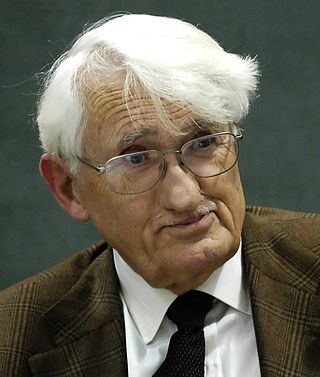
Constitutional patriotism is the idea that people should form a political attachment to the norms and values of a pluralistic liberal democratic constitution rather than to a national culture or cosmopolitan society. It is associated with post-nationalist identity because, while it is seen as a similar concept to nationalism, the attachment is based on the constitution rather than on a national culture. In essence, it is an attempt to re-conceptualize group identity with a focus on the interpretation of citizenship as a loyalty that goes beyond individuals' ethnocultural identification. Theorists believe this to be more defensible than other forms of shared commitment in a diverse modern state with multiple languages and group identities. It is particularly relevant in post-national democratic states in which multiple cultural and ethnic groups coexist. It was influential in the development of the European Union and a key to Europeanism as a basis for multiple countries belonging to a supranational union.
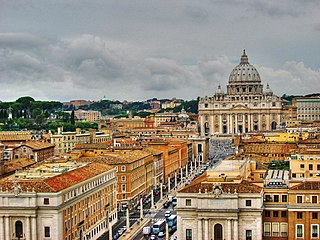
Religion in the European Union is diverse. The largest religion in the EU is Christianity, which accounted for 72.8% of EU population as of 2018. Smaller groups include those of Islam, Buddhism, Judaism, Hinduism, and some East Asian religions, most concentrated in Germany and France. Also present are revival movements of pre-Christianity European folk religions including Heathenism, Rodnovery, Romuva, and Druidry.
Europeans are the focus of European ethnology, the field of anthropology related to the various ethnic groups that reside in the states of Europe. Groups may be defined by common genetic ancestry, common language, or both.

The European Federation, also referred to as the United States of Europe (USE), European State, or Federal Europe, is a hypothetical scenario of European integration leading to the formation of a sovereign superstate, organised as a federation of the member countries of the European Union (EU), as contemplated by political scientists, politicians, geographers, historians, futurologists and fiction writers. At present, while the EU is not a federation, various academic observers regard it as having some of the characteristics of a federal system.

The European Union (EU) uses a number of symbols, including the Flag of Europe, Anthem of Europe, Motto of the European Union and Europe Day.






